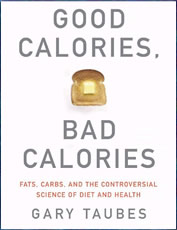 Good & Bad Calories (starts at 4:50) Ever since the 1970s, the rise of obesity in the United States has an epidemic. Researchers around the world are trying desperately to figure out why so many of us get fat, and what we can do to change that. A large amount of funding, and support from public health policy, goes toward the hypothesis that we get fat because we eat too many calories and do not exercise enough; when someone eats more calories than they need, the instructions go, they should exercise. That’s “Calories in, Calories Out.” But recently, an expert with a different point of view spoke to a packed audience of doctors, staff and medical students at the University of Colorado Medical Center. The expert is Gary Taubes, the author of the New York Times bestsellers “Good Calories, Bad Calories” and “Why We Get Fat“. Taubes is also the recipient of angel investor funds: $60 million to devote to research to better understand how the kinds of foods we eat affect our metabolism. Central to Taubes’ ideas is the opinion that “Calories in, Calories Out” simply cannot be enough to explain, or help people, maintain a healthy weight. In this feature, we provide an excerpt from his talk at the CU Medical School.
Good & Bad Calories (starts at 4:50) Ever since the 1970s, the rise of obesity in the United States has an epidemic. Researchers around the world are trying desperately to figure out why so many of us get fat, and what we can do to change that. A large amount of funding, and support from public health policy, goes toward the hypothesis that we get fat because we eat too many calories and do not exercise enough; when someone eats more calories than they need, the instructions go, they should exercise. That’s “Calories in, Calories Out.” But recently, an expert with a different point of view spoke to a packed audience of doctors, staff and medical students at the University of Colorado Medical Center. The expert is Gary Taubes, the author of the New York Times bestsellers “Good Calories, Bad Calories” and “Why We Get Fat“. Taubes is also the recipient of angel investor funds: $60 million to devote to research to better understand how the kinds of foods we eat affect our metabolism. Central to Taubes’ ideas is the opinion that “Calories in, Calories Out” simply cannot be enough to explain, or help people, maintain a healthy weight. In this feature, we provide an excerpt from his talk at the CU Medical School.
 PhD Comics (starts at 13:50) Unless you work in science, you may not always be aware of the humor that goes on among scientists and what the culture is like. So what better way to show the comic parts of science than by way of a comic strip? One of the more well-known science-oriented comic strips is called “PhD Comics” and is written by Jorge Cham, who is trained as an engineer, holds a bachelors degree from Georgia Tech and a PhD in robotics from Stanford. He also was an instructor at Caltech, a researcher in a neuroscience lab, where he studied brain-and-machine interfaces, and he also has a chemistry background. So he has a wide set of experiences to draw on…literally DRAW on…for his comic. We talk with Jorge Cham to find out more about the comic and other ways the scientist comic artist unveils the secret lives of scientists and, in particular, science grad students.
PhD Comics (starts at 13:50) Unless you work in science, you may not always be aware of the humor that goes on among scientists and what the culture is like. So what better way to show the comic parts of science than by way of a comic strip? One of the more well-known science-oriented comic strips is called “PhD Comics” and is written by Jorge Cham, who is trained as an engineer, holds a bachelors degree from Georgia Tech and a PhD in robotics from Stanford. He also was an instructor at Caltech, a researcher in a neuroscience lab, where he studied brain-and-machine interfaces, and he also has a chemistry background. So he has a wide set of experiences to draw on…literally DRAW on…for his comic. We talk with Jorge Cham to find out more about the comic and other ways the scientist comic artist unveils the secret lives of scientists and, in particular, science grad students.
Hosts: Joel Parker, Shelly Schlender
Producer: Joel Parker
Engineer: Jim Pullen
Executive Producer: Susan Moran
Listen to the show:
Podcast: Play in new window | Download (Duration: 24:46 — 22.7MB)
Subscribe: RSS





